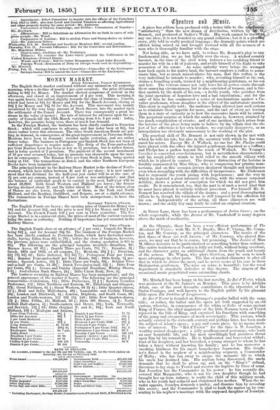*trro ant 311uoir.
A piece has seldom been produced with a better title to the a " satisfactory " than the new drama of Retribution, written by Bennett, and produced at Sadler's Wells. His work cannot be tin any one idea ; it is not founded on any grand collision ; but it is a pl story, ably told in really poetical language ; the dramatic points which are offered being seized on and brought forward with all the acumen of a man who is thoroughly familiar with the stage.
Not being able, as we have said, to reduce Mr. Bennett's play to any fundamental idea, we go but lightly over the story. A wicked country baronet, in the time of the civil wars, induces a too confiding friend to murder his wife in a fit of jealousy, and avails himself of his flight to take possession of his estate. As some unlucky wave brings the wronged man back again to his native land, the baronet employs a ruffian to assas- sinate him, but so much miscalculates his man, that this ruffian is the very individual he intends to murder ; who, revealing him/toff at the end, claims a foundling youth, trained by a neighbouring gentleman, as his son and heir. The veteran sinner not only loses his ill-gotten estate through these annoying circumstances, but is also convicted of treason, and is fur- ther smitten by the death of his son,—a feeble youth, who perishes from the joint operation of hopeless love and a bad constitution ; and for the sake of him he has commenced a series of machinations against a Ca- valier gentleman, whose daughter is the object of the unfortunate passion. This story is capitally told; the audience being allowed just such rations as to stimulate their appetite for more, and the end of every act leaving them in a state of curiosity as to how the successive knots will be untied. The perpetual surprise at which the author aims is, however, attained by too much complication of events ; and of one incident, which arises from the heroine of the piece being made to believe by the villain that the ob- ject of her affections is her own brother, we especially disapprove, as an interpolation too obviously unnecessary to the working of the plot.
The practical skill of Mr. Bennett is not only shown in the tact with which he tells his tale, but also in the accuracy with which he has mea- sured his actors. Except Mr. J. Wallack, no one but Mr. Phelps could have played with due effect the injured gentleman disguised as a ruffian ; and Phelps has a pathos beyond the reach of Wallack. Mr. Younge's Cavalier is somewhat over-boisterous, but is nevertheless characteristic ; and his rough jollity stands in bold relief to the smooth villany with which he is placed in contact. The dreamy distraction of the heroine is forcibly represented by Miss Glyn ; who is conquering her pristine man- nerisms, and on this occasion always displayed thought and intelligence even when struggling with the difficulties of inexperience. Mr. Dickenson had to represent the youth pining with hopelessness ; and the way in which he depicted a great intensity of feeling, with the utmost corporeal debility, shows a power of conception for which we did not give him credit. Be it remembered, too, that the part is of such a novel kind that he must have played it entirely without precedent. For himself Mr. G. Bennett has reserved the villain of the drama ; and a good thoroughgoing villain he is, though his wickedness is still tempered by his affection for his son. Independently of the acting, all these characters arc well drawn ; and the sickly boy may fairly be called an original creation.


























 Previous page
Previous page